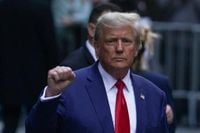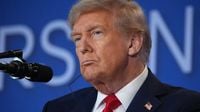In a stunning legal turn, a New York state appeals court has thrown out the eye-popping $500 million civil fraud penalty against former President Donald Trump, marking a significant—though not total—victory for the embattled real estate mogul and political figure. The ruling, handed down on August 21, 2025, reverberated through political and legal circles, reigniting fierce debate over the motivations behind the case and what it means for the future of Trump, his business empire, and the ongoing political climate.
The penalty, which had ballooned to more than $515 million with interest, stemmed from a high-profile lawsuit brought by New York Attorney General Letitia James. The suit alleged that Trump and his associates engaged in a decade-long scheme to enrich themselves by defrauding banks and investors, inflating asset values to secure favorable financing terms. Justice Arthur Engoron, who presided over the original case, agreed with James’ assessment, ordering Trump, his companies, and his trust to pay the state hundreds of millions in so-called “ill-gotten gains.”
But the five-judge panel of the Appellate Division saw things differently—at least when it came to the financial punishment. “While harm certainly occurred, it was not the cataclysmic harm that can justify a nearly half billion-dollar award to the state,” wrote appellate Judge Peter Moulton in the court’s sprawling 300-page opinion. The panel ruled that the penalty was “an excessive fine that violates the Eighth Amendment of the United States Constitution,” according to reporting by Fox News and other outlets. The decision effectively wiped out the $364 million penalty plus interest, but left the underlying finding of fraud intact.
For Trump, the ruling was cause for celebration. He took to his Truth Social platform to declare “TOTAL VICTORY,” writing, “It was a Political Witch Hunt, in a business sense, the likes of which no one has ever seen before. This was a Case of Election Interference by the City and State trying to show, illegally, that I did things that were wrong when, in fact, everything I did was absolutely CORRECT and, even, PERFECT.”
Yet, as many legal analysts and even Trump’s critics were quick to point out, the appeals court’s decision is far from an exoneration. The panel upheld Justice Engoron’s finding that Trump and his co-defendants committed “brazen fraud.” The court also maintained other sanctions: Trump is barred from holding executive positions in New York companies for three years, and his sons Eric and Donald Trump Jr. face a two-year ban from similar roles. The Trump Organization’s ability to secure loans from New York banks remains restricted for three years. These penalties, though paused during the appellate process, could be reinstated depending on the outcome of further appeals.
Attorney General James, undeterred by the setback, pledged to appeal the decision to New York’s highest court. In a statement, she emphasized, “The court upheld the injunctive relief we won, limiting Donald Trump and the Trump Organization officers’ ability to do business in New York. It should not be lost to history: yet another court has ruled that the president violated the law, and that our case has merit.”
The legal saga has been anything but straightforward. The original lawsuit was the result of a three-year investigation led by James, who accused Trump and his associates of systematically falsifying financial statements to mislead lenders and insurers. Engoron’s decision, delivered in a 92-page order, was scathing: “Their complete lack of contrition and remorse borders on pathological,” he wrote. “They are accused only of inflating asset values to make more money. The documents prove this over and over again. This is a venial sin, not a mortal sin. Defendants did not commit murder or arson. They did not rob a bank at gunpoint. Donald Trump is not Bernard Madoff. Yet, defendants are incapable of admitting the error of their ways.”
The appellate decision itself was not unanimous. Justice David Friedman, in a partial dissent, argued that James’ prosecution was politically motivated and should have been dismissed outright. “Plainly, her ultimate goal was not ‘market hygiene’ ... but political hygiene, ending with the derailment of President Trump’s political career and the destruction of his real estate business,” Friedman wrote, as reported by Fox News Digital. He took issue with the use of New York’s Executive Law Section 63(12), which grants the attorney general broad civil fraud powers, calling its application in this case “unprecedented and political.”
This view has been echoed by Trump and his supporters, who have long claimed the legal actions against him are part of a broader campaign of “lawfare” aimed at weakening his political prospects. “Justice and truth was never what Attorney General James and Manhattan Supreme Court Justice Arthur Engoron wanted. Destroying President Trump was the only thing that mattered. They’re both a disgrace to their offices,” wrote Bruce Collins of Middletown, NJ, in a letter published by the New York Post.
Others, however, see the case as a legitimate effort to hold a powerful figure accountable. Alan Swartz of Verona, NJ, cautioned, “As much as Trump is claiming victory in the appeal of the award in his New York fraud case, remember that just the award was tossed and not the guilty verdict.”
The political dimensions of the case have only intensified with new allegations and investigations. The Department of Justice is reportedly investigating Letitia James herself for alleged mortgage fraud, including claims she misrepresented her primary residence on loan applications in Virginia and New York. James has denied the allegations, characterizing the probe as retaliation for her pursuit of Trump.
The appellate ruling also has practical financial implications. Trump, who had posted a $175 million bond to stave off asset seizures while his appeal was pending, is now eligible to reclaim those funds. If the penalty had been upheld, he would have been forced to pay the full amount or risk the state seizing his assets.
Despite the high drama, the story is far from over. The case is expected to head to New York’s Court of Appeals, the state’s highest court. Both sides are preparing for a protracted legal battle that could shape not only Trump’s business future but also the broader landscape of political accountability and prosecutorial power in the United States.
As the dust settles—at least for now—one thing is clear: the legal and political fights surrounding Donald Trump show no signs of abating. Whether this latest decision will ultimately help or hinder his political ambitions, or simply further polarize an already divided nation, remains to be seen. For now, Trump has notched a rare financial win, but the shadow of legal liability continues to loom large over his business empire and public life.


